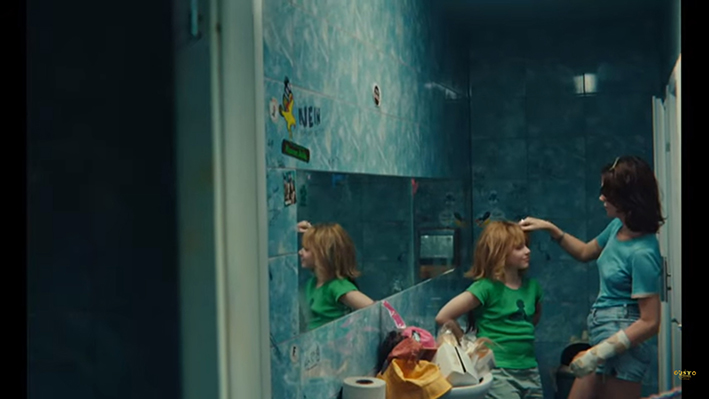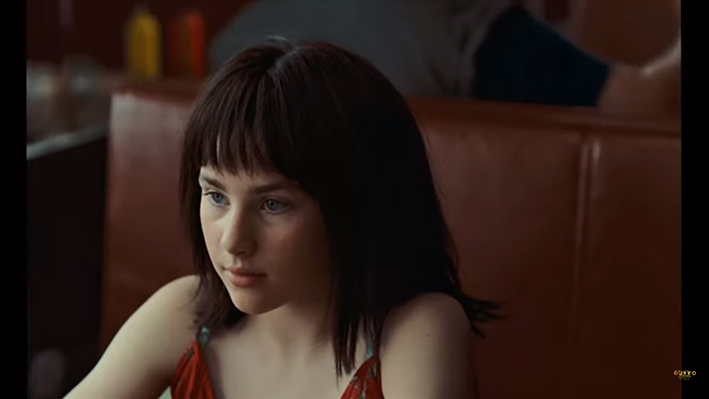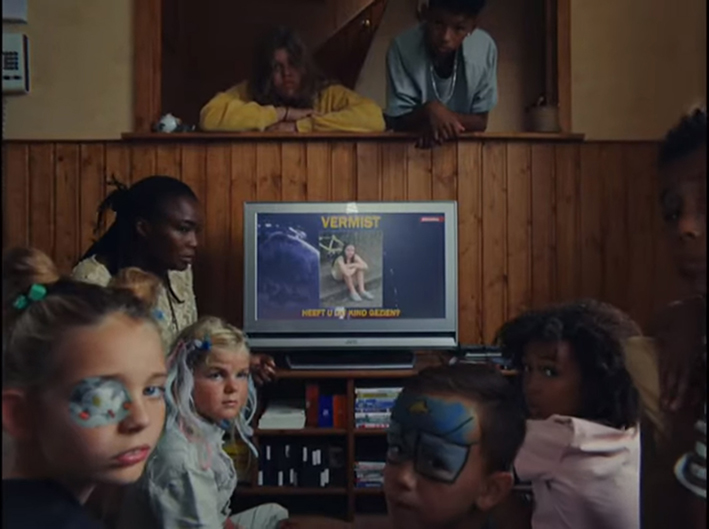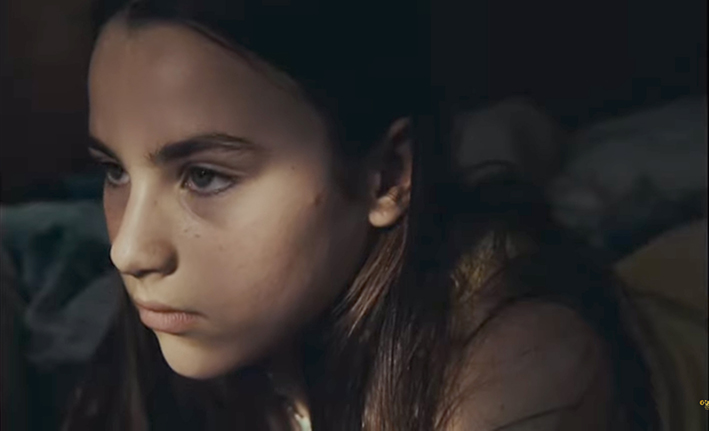Take the love and run: “Kiddo” or the perfect genre to tell the story of a different motherhood.

An interview by Adriana Chávez García-Rendón
“Kiddo” (Netherlands,2023, Directed by Zara Dwinger. Screenplay Nena van Driel & Zara Dwinger) has recently been released at the Berlin Film Festival. Cinema Jove at Valencia, Spain, has had the good taste of choosing it for its official section. And it will be in cinemas from the five of July.
It’s a pleasure finding a young crew offering a very well told story. This feature film is about a special motherhood, viewed from the perspective of the eleven year old daughter. I would start underlining the way that Zara Dwinger used her narrative tools, turning quite a difficult subject into a “lighthearted” and funny comedy. Low budget, high quality. The way Zara uses the sound as a narrative tool plays a very important role in the final result. This is a road movie out of illness, absence and childhood, delicate and heavy subjects that can easily fall into drama. Since both, Director Zara Dwinger and co-scriptwriter Nena van Driel, were very decisive in making easy the viewing of this problem, I faced the fact that their film is exquisitely “social”. I had a very particular interest in interviewing them and their main actress, to let you know how this brilliant film has been made.
11-year-old Lu lives in foster care and dreams of seeing her long-absent mother Karina again. Apparently she lives like a true movie star in Hollywood – she even does her own stunts. When Karina shows up unexpectedly, she takes Lu on an adventurous road trip in her beat-up sports car, unbeknownst to her foster family. They go to Lu’s grandmother, all the way in Poland, to retrieve a pile of money that Karina hid there years earlier. That way they can start over and be together forever, Karina promises. It will be a thrilling and exciting ride as Karina’s life motto is «all or nothing». But gradually Lu realizes that ‘just a little’ can also be very nice.
Kiddo is the debut feature film by Zara Dwinger and had its world premiere at the Berlin Film Festival. With a nod to the lovers-on-the-run genre, Kiddo offers a fresh perspective on the life of an imperfect parent and protecting your own boundaries as a child.

The point of view of Lu takes us trhough the thoughts of a child. You use fragments of cartoons, hillarious scenes and a peculiar soundtrack. Did you already think of using those tools when writing the script? The soundtrack also plays an important narrative role in your film, in my words it’s an expressionist treatment of the sound.
Zara: The fun thing about making movies is that you can use everything to express the story: you have the image, the actors, but also the sound, the music the colouring, everything… So I always work using as many tools as possible. I think that I tried to really express the feelings of the characters through every narrative element but maybe with this film, it was even more because we agreed in the idea that everything should be large and live. It’s like a childish point of view. So in the sound we really try to express her view and “hearing point”.
Yes, that’s actually quite innovative for me, we always talk about how this o that director seeds information in the viewer through the “point of view”, so we know what the characters see. In this case we “know what the main character hears”. Did you already planned it in the script?
About your question, I already knew that I really wanted to bring to life the perspective of Lu. It’s a really nice perspective because it’s a child’s point of view, so you can really play in and out. As a child you see everything more vague, so while we were writing the script we already knew how it was ment to be. And we shut the whole film, we had everything in the editing room and we were putting it together. After the first edit, the rough-cut it wasn’t horrible, but always the first cut is like “oh okay”, I thought “we’ll have to do something”. Ihe first thing I knew was “okay we need to work on the tone of the film” related to the humour and the playfulness, so we started with her, Lu. We would try to make everything a little bit funnier, lighter or playful, but also one of the ideas was “okay, maybe we need to increase the use of the sound” because without it sometimes it was so quiet and then it became serious but not in a good way.
So we just begun to have fun, we said “we’re gonna give everything a sound” and when we watched the first ten minutes it was okay! “Yeah we need to do this” (so much work) so then we spent so much time giving everything a sound and it absolutely worked . This is for the film needs all these kind of playing for imaginative things. The characters gave us the opportunity to do that because it’s the way they think. That’s that’s how we did came to the soundtrack, they are what we have created. Then of course in the sound design we made it even better. We really tried to express her viewpoint and her “hearingpoint”.

You are a young filmmaker, scriptwriters and actress, for the young filmmakers to be, let’s talk about the photography. What kind of film did you use and what kind of device, was it a chemical film or was it digital?
Zara: It was digital, but we wanted to shoot on 16 mm because I really wanted to give this nostalgic feeling to the film. If you see the film as a grown-up then you would look back to your youth with a little bit of nostalgy, so I really wanted to create the feeling of watching a nostalgic film. About the filmtape, we actually wanted to film in 16 mm but we didn’t have the money and the means and so that’s when we started shooting digital. Then we destroyed the image later on and we worked with this really great colour corrector, he’s really good at destroying the image so well, that he gets the film look like and old one!
This is a question that comes to me as a filmmaker, what filter of color correction have you used and which camera?
I have to double check but think it was a “Kodak look” with an Alexa camera.

Nena, talking about your task as a scriptwriter, did you already have these “epiphanies” (scenes representing her imagination and thoughts), in the writing process?
Nena: Well, in essence, we did think about it, but a lot of things were added later, like the stock imagery. That’s archive, and we started in the editing, when writing we already worked on the fantasy that Lu has about her mom, and we actually played a lot with these type of form experiments as well.
Sometimes we didn’t had a version with animated stuff like the one we used in the end. In the script we had the main theme that eventually ended up in the film, we had the begining: for example, the memory that Lu has of her mom. Then the cartoons and the other narrative stuff were really created in the editing, but we had a lot of conversations while developing the script, so that we could add those elements later.
About the “epiphanies”, Zara edited them. They came later.
Zara: Those funny scenes representing the thoughts of Lu came during the shooting, we thought of shooting the takes with my cameraman. They’re out of the script. There’s a particular moment in the story when she feels in danger, real danger. I was aware of the importance to make the audience feel like she’s going to die… in a funny way, so we shut the take, but then while editing we used it in a different moment.
When and how did you start this project?
Zara: We started the project together. Nena and I went to film school together. After graduating we started talking about making a film. It has all began with the brainstorming and making a small vote for all these things and ideas in process that we had. We wanted to have a child as the main character. That idea was really obvious to us. Then we developed it a little in the story. We approached some producers -Zara was already working with Studio Ruba- and once in agreement with the producers, we applied for the funds for developing the script of the film. Eventually we developed it in “developing block for youth films” and in between the program of financing we started to write the story together.

What did you picth at the begining? Did you have the whole story?
What we offered in the first pitch was the basis of the story, a girl that grows up with a parent that is different from the regular parents. Then we thought of writing about a mother that has mental health issues. That’s how we started playing with the action of the character, where did she go? And the rest of specifics weren’t clear but it we were sure that she was really meant to offer the unconventional parenthood: It’s a specific motherhood; we see a lot of stories of a father that is leaving, but not mothers. We want to talk about this these three elements actually that are immediately very important for us: the absence, the child and the illness. Not being there for not being capable to be a traditional mother.
Your film reminds me of “Thelma and Luise”. The car, some of the elements of the outfit and props. Have you both seen it?
Nena: Yes we had seen it before going to the film school. When the aspect of road movie came to our path we both really loved the “lovers on the run” genre. We did watch “Thelma and Luise” a lot. In the story we were already playing with its structure, too. We also analysed “Thelma and Luise” to see how did it work and how would we build up the story. Where are they driving and where do they stop?. As you know it’s a genre on its own, so we are completely into that as well and made it our own “lovers on the run” story.
Zara: If I can add something, Nena mentioned three elements: the child, the mother, the illness. The fourth element is that we really wanted to make a lighthearted and funny story about this. An ill mother is already a heavy subject so that’s why we wanted to make it light. The genre “lovers on the run” was really nice and it helped us make it lighter because okay, it’s about a mother and daughter, but it’s also just a funny story where they have a big adventure. So it was really a nice tool to bring this lightness to the film.
Nena: In the begining we had one element: mental illness, but we were really decisive about also showing a full spectrum of it. Then, maybe focusing more from the perspective of a child. If you have a mother who has a manic episodes you also know that she really lives life to the full, and she is larger than life. In that sense it can be fun .So it also not only like tragic part of it but also the fun and the inspirational actions. She lives her life like she’s in a road movie.
Is that the reason why the genre is always present in the story, constantly mentioning “Bonnie and Clyde”?
Zara: Yes, it’s the most iconic film, and also a little bit funny. Of course that we have two women on the road in our story, so is that we were studying “Thelma and Luise”. “Bonnie and Clyde” seems like a romantic story but at the same time it’s really horrible since they die, so that was not for our story.
Nena: “Bonnie and Clyde” created the genre, it’s the beginning, it was the first one. Here we are linking to those old movies and on the nostalgia also Karina, the mother, has.
You talk about women, not only in this film but on your previous one, “Julia and Yulia” is that because it’s easier for us women to talk about ourselves?, or because we’re in the moment of having more funds for women according to the policy itself, defending the rights of our genre in the cinema industry?.
I always find it at that kind of question interesting. For me it’s just natural to tell a woman’s story. It’s not something I choose or think about, but sometimes I forget that it is kind of special. I know it is, it’s really just a natural thing. I think that’s also the reason why it’s so important that a lot of different kind of people get a voice because women like people of colour it’s not natural for us or for them to tell your own story, like a story based from your perspective, so that’s the thing, it’s not like a deliberate choice although I have to say that I don’t know if I would like to tell a story about a man. Just a man. We have enough of those stories.
Let’s talk to Rosa. How did you know about this project?
Rosa: Well, casting Director asked me if I wanted to do an audition for this movie. They had seen me in a trailer of a series, where I played in, and they wanted to test me.
How is it watching yourself in the screen being the daughter of a mother like that? How does it feeI like having a mother like Karina?
Rosa: I know that is fake so it’s fine, but I don’t see myself. I see Lu Lu with her mother. She is a little crazy but sweet though.
When you were in the casting, did you know what the film was about?
Rosa: Well… I had to prepare a scene, so I knew that she was Lu with her mother, and they would make a trip. But I didn’t know the whole story, I just knew a little bit. I knew that she was not a perfect mum that she couldn’t take care of Lu.
Have you studied drama Rosa?
Rosa: When I was eight, I’ve attended to a drama club in my Village. It was just small and then my teacher sent an email to all the kids in my class, saying “we need a girl with, blue eyes, black brown hair” I did an audition not for this movie but for another. Then another series came up, and then this one.
Do you have any feeling about how it’s going to be your life like? can you picture yourself being an actress?
Rosa: I think I wanna do it really, The I don’t know, maybe I want to do the high school and the drama school after.


